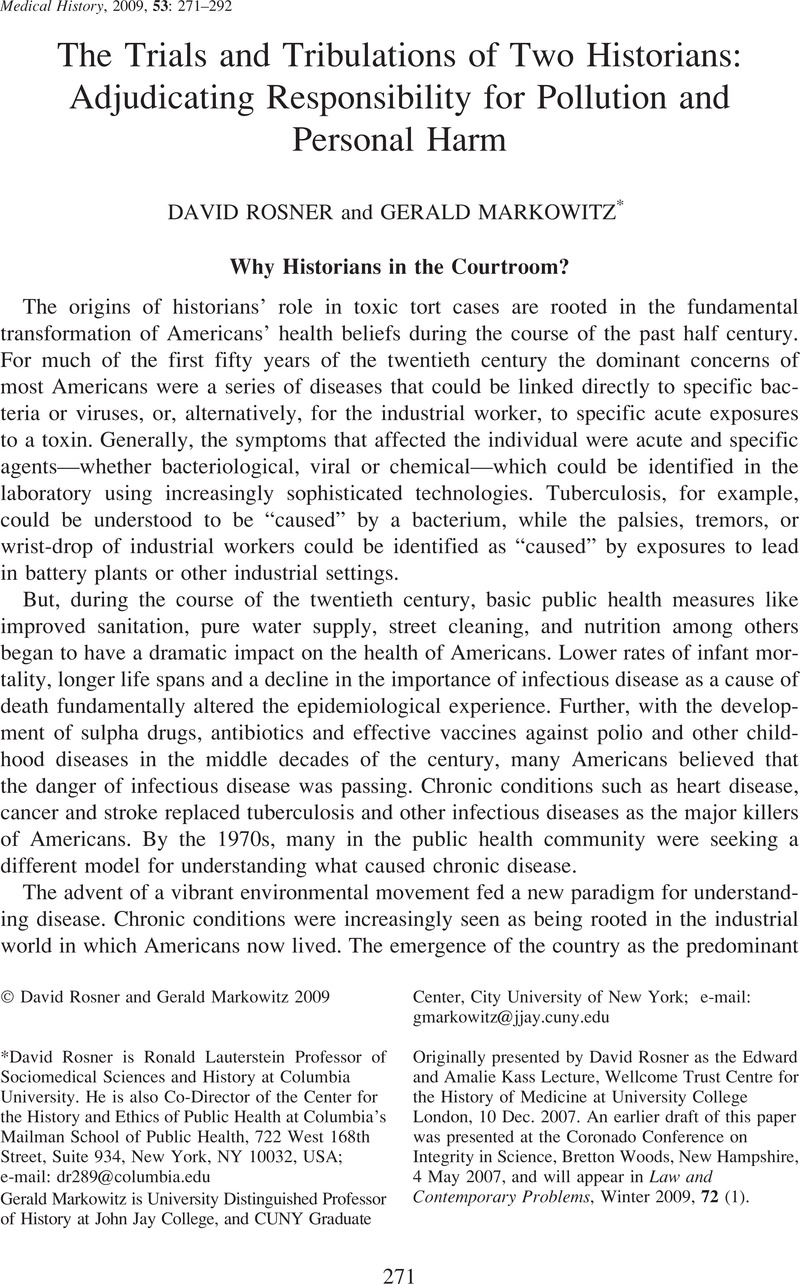Article contents
The Trials and Tribulations of Two Historians: Adjudicating Responsibility for Pollution and Personal Harm
Published online by Cambridge University Press: 17 May 2012
Abstract

- Type
- Articles
- Information
- Copyright
- Copyright © The Author(s) 2009. Published by Cambridge University Press
References
1See e-mail: Barb Noverini to David Rosner, ‘RTG Consulting Opportunity for an Academic Historian’, 13 Jan. 2005. See also http://www.roundtablegroup.com/litigation/experts.cfm (accessed 27 Nov. 2008) the website for their experts in which it is noted that their academic consultants now number over 65,000, including university deans and prominent professors.
2State v. Lead Indus. Ass'n, 2007 R.I. Super. LEXIS 32, 2–11, 318–19 (26 Feb. 2007).
3Gerald Markowitz and David Rosner, Deceit and denial: the deadly politics of industrial pollution, Berkeley, University of California Press; and New York, Milbank Memorial Fund, 2002.
4Patricia Cohen, ‘History for hire in industry lawsuits’, New York Times, 14 June 2003, pp. B-7-9; Significantly, the origins of historians entering into liability cases originated with the defence themselves. Robert Proctor reviewed the efforts of the tobacco industry to recruit historians to testify for the industry as early as 1987. One of the first was “a professor of history at Ohio State University and section director for Project Cosmic, Philip Morris's secret effort (1987–1993) to produce ‘an international network of scientists and historians’ to write histories casting the industry in a favorable light”, see Robert Proctor, ‘“Everyone knew but no one had proof”: tobacco industry use of medical history expertise in US courts, 1990–2002’, ‘TC Online', 28 Oct. 2004, (http://tobaccocontrol.bmj.com/cgi/content/full/15/supp_4/iv117); Expert Disclosure of John C Burnham, Cipollone v. Liggett Group, Inc., et al. In the Cipollone Civil Action No. 83-2864SA, 1986 (est.), pp. 2–3. Bates No. 2024941548-1551. http://tobaccodocuments.org/pm/2024941548-1551.html (accessed 27 Nov. 2008).
5Proctor, op. cit., note 4 above.
6Allan M Brandt, The cigarette century: the rise, fall, and deadly persistence of the product that defined America, New York, Basic Books, 2007.
7D Ozonoff, ‘Failed warnings: asbestos-related disease and industrial medicine’, in Ronald Bayer (ed.), The health and safety of workers: case studies in the politics of professional responsibility, Oxford University Press, 1988, pp. 139–218; and Barry I Castleman, Asbestos: medical and legal aspects, 5th ed., New York, Aspen, 2005.
8See Markowitz and Rosner, op. cit., note 3 above, and also note 16 below.
9History Associates Website, http://www.historyassociates.com/ (accessed 27 Nov. 2008).
10Brian W Martin, ‘Working with lawyers: a historian's perspective’, OAH Newsletter, May 2002, 30, available at: http://www.oah.org/pubs/nl/2002may/Martin.html (accessed 27 Nov. 2008).
11J Morgan Kousser, ‘Are expert witnesses whores? Reflections on objectivity in scholarship and expert witnessing’, The Public Historian, 1984, 6 (1): 5–19.
12Ibid., p. 15.
13David J Rothman, ‘Serving Clio and the client: the historian as expert witness’, Bull. Hist. Med., 2003, 77: 25–44, p. 44.
14Ibid., p. 44.
15John A Neuenschwander, ‘Historians as expert witnesses: the view from the bench’, OAH Newsletter, Aug. 2002, 30, available at: http://www.oah.org/pubs/nt/2002aug/neuenschwander.html (accessed 27 Nov. 2008).
16David Rosner and Gerald Markowitz, Deadly dust: silicosis and the politics of occupational disease in twentieth-century America, Princeton University Press, 1991, recently republished and updated as Deadly dust: silicosis and the on-going struggle for workers’ health, Ann Arbor, University of Michigan Press, 2005.
17Nathan A Schachtman, ‘On deadly dust and histrionic historians: preliminary thoughts of history and historians as expert witnesses in products liability cases’, Mealey's Litigation Report: Silica, vol. 2, no. 3 (King of Prussia, Pa., LexisNexis, 2003), p. 1.
18Ibid., pp. 1–6.
19David Rosner and Gerald Markowitz, ‘“A gift of God”?: the public health controversy over leaded gasoline during the 1920s', Am. J. Public Health, 1985, 75: 344–52; editorial, ‘One man's meat, another man's poison: two chapters in the history of public health’, Am. J. Pub. Health, 1985, 74: 338–40.
20Markowitz and Rosner, op. cit., note 3 above.
21Peter Lord, ‘Judge refuses to overthrow lead paint conviction’, Providence Journal, 27 Feb. 2007, p. A-1-6.
22Immediately after the case was settled the stock market responded to the verdict by forcing Sherwin Williams stock to plunge and Business Week announced that ‘Costs of lead clean-up soar’. While the legal manoeuvering by the industry to delay the jury verdict continues, Bloomberg.Com announced that in light of the Rhode Island decision the Attorney General in Ohio has initiated a similar suit. Michelle Smith, ‘Estimates of lead clean-up soar’, Business Week Online, 26 March 2007; Jef Feeley, ‘Sherwin Williams, DuPont sued by Ohio Lead Paint’, Bloomberg.Com, http://www.bloomberg.com/apps/news?pid=email_en&refer=&sid=aQb5ogfWCWQk (accessed 27 Nov. 2008).
23See, http://www.deceitanddenial.org/, the website Merlin Chowkwunyun established for us. On it are numerous reviews, our timeline, Scranton's attack and our defence. Also, we have posted links to thousands of pages of documents that form the core of the research for two chapters of the book.
24Review of Deceit and denial by Anthony Robbins, Journal of Public Health Policy, 2003, 24 (3/4): 492–4, p. 493.
25Lila Guterman, ‘Peer reviewers are subpoenaed in cancer lawsuit against chemical companies’, Chronicle of Higher Education, 19 Nov. 2004.
26Jon Wiener, ‘Cancer, chemicals and history’, The Nation, 7 Feb. 2005, pp. 1–3, http://www.thenation.com/doc/20050207/wiener.
27Ibid., p. 3.
28Robert Proctor, ‘Should historians be working for the tobacco industry?’, Lancet, April 10, 2004, 363: 1174–5.
29Schachtman, op. cit., note 17 above, p. 1.
30State of Rhode Island, Providence, Sc, Docket No. 99-5226, State of Rhode Island, by and through Patrick Lynch, Attorney General, Plaintiff vs Lead Industries Association, Inc., et al., Defendants, volume Iii videotaped deposition of David Rosner, Law Offices of Arnold & Porter, New York, July 6, 2005.
31Ibid.
32In the Circuit Court of Kanawha County, West Virginia. In Re: Asbestos Personal Civil Action Injury Litigation Mass No. 02-C-9004 Litigation Panel Deposition Transcript of Philip Scranton, PhD Deposition Date: September 18, 2002, Wednesday, 10:10 a.m.
33Proctor, op. cit., note 28 above.
- 7
- Cited by


